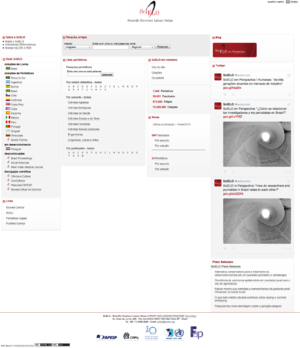Scielo - Scientific Electronic Library Online
Self-portrait
SciELO - a model for cooperative electronic publishing in developing countries
The access to adequate and up-to-date scientific and technical information is essential for the economic and social development, specially to support decision making process in planning, formulation and implementation of public policies and to support professional development and practice. The results of scientific research are mainly communicated and validated through publication in scientific journals. This is valid for developed and developing countries. However, scientific journals from developing countries face several distribution and dissemination barriers, which limits the access and usage of locally generated scientific information.
SciELO - Scientific Electronic Library Online is a model for cooperative electronic publishing of scientific journals on the Internet. Especially conceived to meet the scientific communication needs of developing countries, particularly Latin America and the Caribbean countries, it provides an efficient way to assure universal visibility and accessibility to their scientific literature, contributing to overcome the phenomena known as 'lost science'. In addition, the SciELO model comprises integrated procedures for the measurement of usage and impact of scientific journals.
SciELO Model is product of a partnership among FAPESP (http://www.fapesp.br)– the State of São Paulo Science Foundation, BIREME (http://www.bireme.br) - the Latin America and Caribbean Center on Health Sciences Information, as well as national and international institutions related to scientific communication and editors. A pilot project, involving 10 Brazilian journals from different subject areas, was successfully carried out from March 1997 to May 1998, aimed at the development and evaluation of an adequate methodology for electronic publishing on the Internet. From June 1998, the project begins to operate regularly, incorporating progressively new journal titles and expanding its operation to other countries. Since 2002, the Project is also supported by CNPq (http://www.cnpq.br) - Conselho Nacional de Desenvolvimento Científico e Tecnológico.
The SciELO Model comprises three components.
The model's first component is the SciELO Methodology, which enables the electronic publication of complete editions of scientific journals, the organization of searchable bibliographical and full text databases, the preservation of electronic archives and the production of statistical indicators of the scientific literature usage and impact. The methodology includes also journal evaluation criteria based on international scientific communication standards. SciELO full texts are enriched with dynamic hypertext links with national and international data bases, as for example, LILACS and MEDLINE.
The SciELO Model's second component is the application of the SciELO Methodology to operate web sites of collections of electronic journals. The SciELO Model envisages the operation of national sites as well as thematic sites. The pioneer application is the SciELO Brazil site ( http://www.scielo.br). Nowadays, Chile (http://www.scielo.cl) and Cuba (http://www.scielo.sld.cu) are also operating applications regularly. Several other countries are evaluating and/or being trained on the SciELO Methodology. SciELO Public Health ( http://www.scielosp.org ), a regional thematic library covering Public Health scientific journals from Latin America and Spain, was launched in December 1999. A portal to integrate and provide access to the network of SciELO sites operates at http://www.scielo.org .
The Model's third component is the actual development of partnerships among national and international scientific communication players — authors, editors, scientific and technological institutions, funding agencies, universities, libraries, scientific and technological information centers etc, aiming at the dissemination, improvement and sustainability of the SciELO Model. The operation of the SciELO network is highly based on national infrastructures, which contributes to guarantee its future sustainability.
The successful development of the proposed SciELO network of Latin America and Caribbean scientific journals in the next years will contribute to make locally generated scientific information readily available, which will ultimately contribute to increase the usage of scientific and technical information on decision making process at different levels.
(http://www.scielo.org/php/level.php?lang=en&component=42&item=1)
Description
Biblioteca electrónica en línea y base de datos de acceso abierto a revistas y artículos académicos de carácter científico, funge como un modelo cooperativo de investigación y publicación en Latinoamérica, España, Portugal y Sudáfrica.
El desarrollo de Scielo comienza en 1997 en Brasil, como un proyecto de la Fundación para el Apoyo a la Investigación del Estado de Sao Paulo y el Consulado Nacional de Desarrollo Científico y Tecnológico en colaboración con el Centro de Información de Ciencias de la Salud de Latinoamérica, el Caribe y España.
El proyecto plantea una metodología para la organización, archivo, y análisis de textos científicos, con el fin de impulsar la investigación, evaluación y difusión del material producido por especialistas en colaboración con instituciones públicas en un amplio rango de disciplinas entre las ciencias exactas y las humanidades.
Scielo opera mediante sitios para publicaciones de regiones específicas: Scielo Brazil, Scielo Cuba, Scielo Colombia, etc. y también mediante el sitio internacional: Scielo salud pública, dedicado a la publicación de revistas en materia de salud.
La búsqueda de información en cada sitio se puede realizar a través de índices organizados por materias, títulos, autores, palabras ciudades o fechas de publicación.
Publications
Abel L. Parker (et al.) (2014) SciELO: 15 Years of Open Access.
Links
URL: http://www.scielo.org/php/index.php
Wayback Machine: https://web.archive.org/web/*/http://www.scielo.org/php/index.php
Wikipedia: https://es.wikipedia.org/wiki/SciELO
